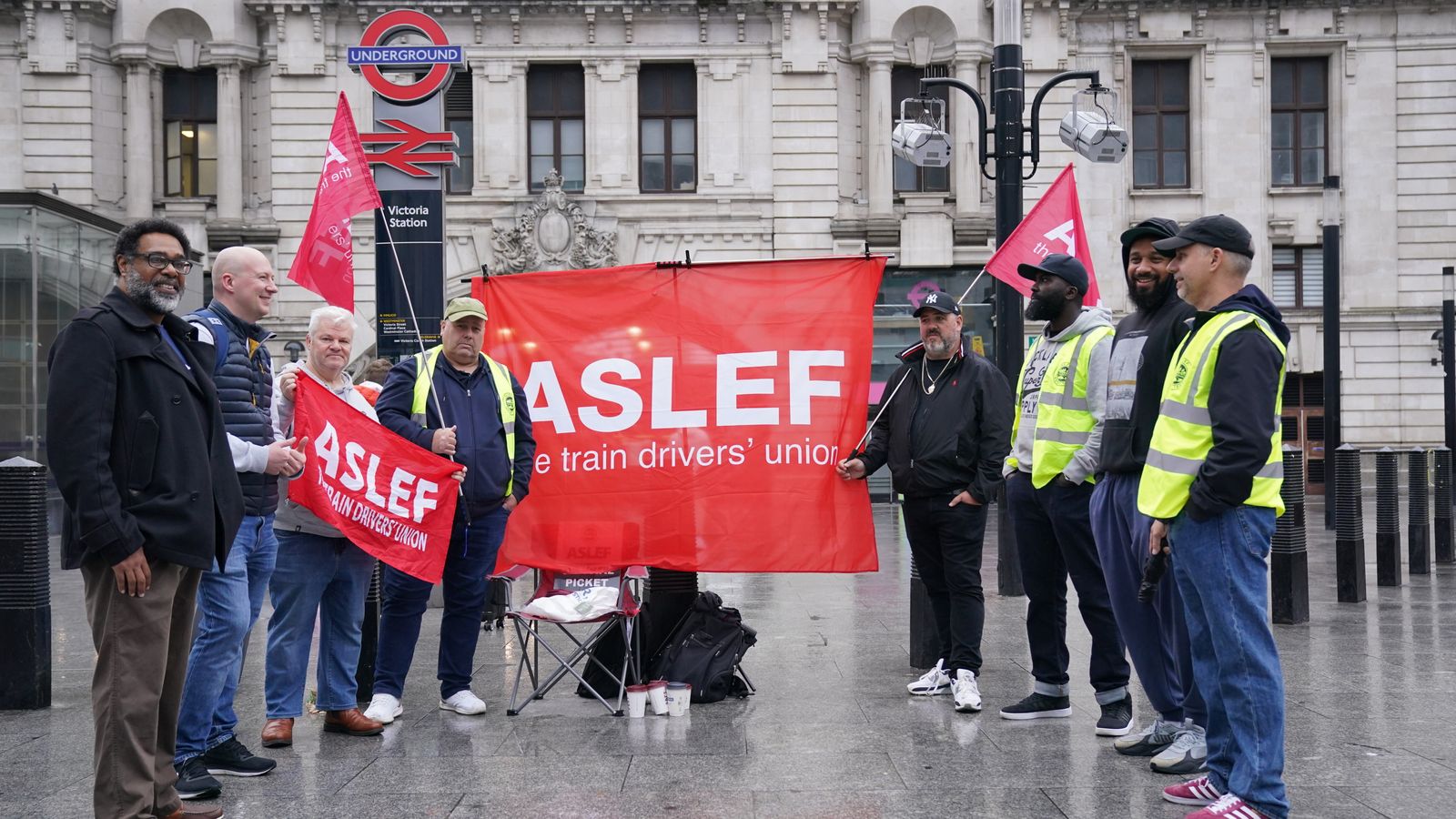ASLEF’s train drivers are staging a series of strikes this weekend, marking the start of major disruption over the next week.
Union members at East Midlands Railway and LNER will walk out on Saturday, followed by drivers on four other lines on Sunday.
A total of 15 train operating companies will be affected by strike action between today and Friday 8 December after ASLEF members voted to continue taking industrial action for the next six months.
The strike days are amplified by a union-wide overtime ban which started on Friday and will run until Saturday 9 December.
Full list of dates in December 2023 and rail lines affected
East Midlands Railway said it will not operate services on any of its routes on Saturday, while the overtime ban may cause some late notice cancellations and changes to train times.
Passengers are advised to check before travelling.
RMT: Rail workers accept deal to end their long-running dispute over pay and conditions
Train strikes: Full list of dates in December 2023 and rail lines affected
Train drivers’ union ASLEF announces new rail strikes in run up to Christmas
LNER is running a reduced timetable between Edinburgh and London and Leeds and London on Saturday.
There will also be no trains to or from London King’s Cross on Sunday due to planned engineering work.
Please use Chrome browser for a more accessible video player
An LNER statement said bus replacements would be in place on Sunday but warned they would have “extremely limited availability and will take considerably longer [approximately 120 minutes].”
Strikes on Sunday will affect Avanti West Coast, Chiltern, Great Northern Thameslink and West Midlands Trains, while more strikes against other operators will be held on Tuesday, Wednesday, Thursday and Friday next week.
They come days after members of the Rail, Maritime and Transport (RMT) union voted overwhelmingly to accept a deal to end their long-running dispute over pay and conditions.
The Rail Delivery Group (RDG), which represents train companies, has criticised ASLEF for not following RMT’s approach and putting the latest pay offer to its members, which it says would take average driver salaries from £60,000 to nearly £65,000.
ASLEF’s general secretary Mick Whelan said he has not had any talks with employers since April and has not met Transport Secretary Mark Harper since last December.
“We are in this for the long haul,” he said.
“Our members, who have not had a pay rise for nearly five years now, are determined that the train companies and the Tory government that stands behind them do the right thing.
“The cost of living has soared since the spring and summer of 2019, when these pay deals ran out.
“The bosses at the train companies – as well as Tory MPs and government ministers – have had increases in pay. It’s unrealistic and unfair to expect our members to work just as hard for what, in real terms, is considerably less.
“These are key workers who kept the country moving throughout the pandemic. They are simply asking for a fair and decent deal.”
Read more:
Drivers warned as pothole breakdowns hit record levels
Should we be worried about the JN.1 COVID variant?
An RDG spokesperson said: “This unnecessary and avoidable industry action called by the ASLEF leadership has been targeted to disrupt customers and businesses ahead of the vital festive period.
“It will also inflict further damage on an industry that is receiving up to an additional £175m a month in taxpayer cash to keep services running, following the COVID downturn.”
Rail minister Huw Merriman said: “Following RMT members voting to overwhelmingly accept the train operators’ pay offer, ASLEF is now not just the only rail union still striking but the only union not to even put an offer to its members.
“They are instead choosing to cause more misery for passengers and the hospitality sector this festive period.”
Be the first to get Breaking News
Install the Sky News app for free
“The fair and reasonable offer that’s long been on the table would bring the average train driver’s salary up to £65,000 for a 35-hour, four-day week,” Mr Merriman added.
“ASLEF’s leadership should follow in the footsteps of all the other rail unions by doing the right thing and giving their members a say on that offer.”
Passengers who still intend to travel on days affected by strikes and overtime bans have been encouraged to check the National Rail’s journey planner before setting off.







